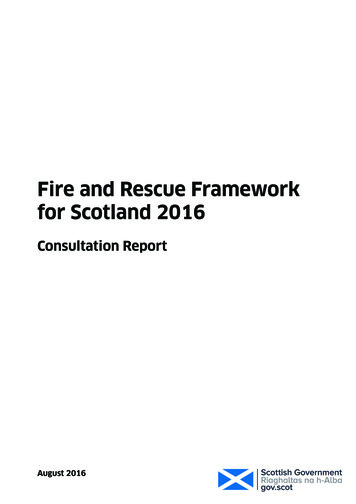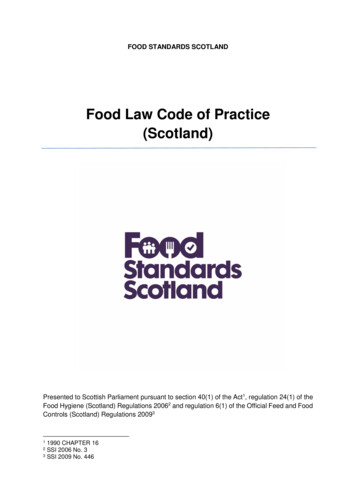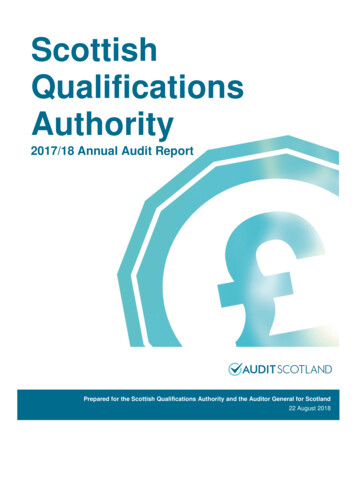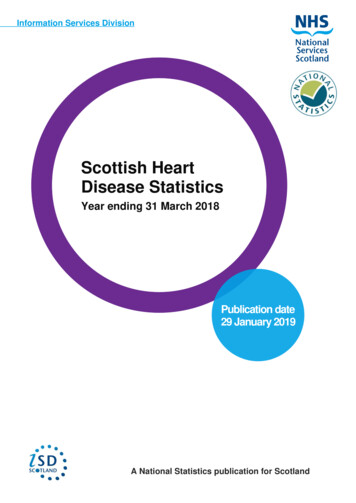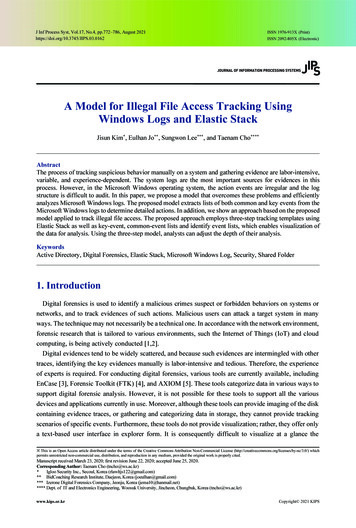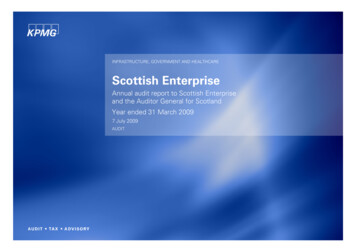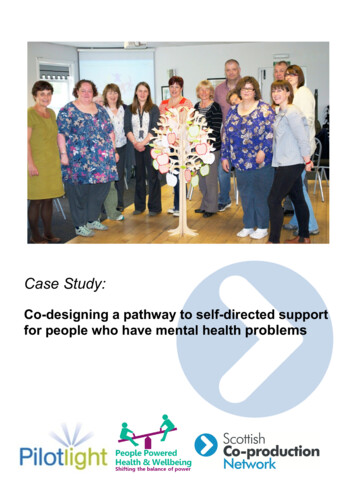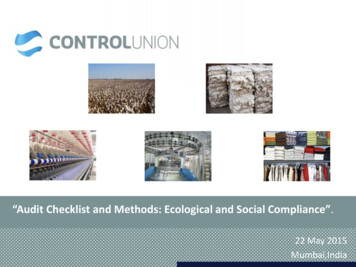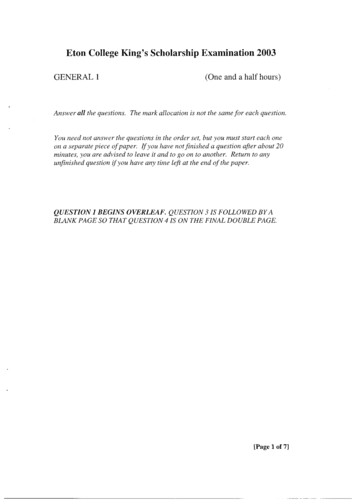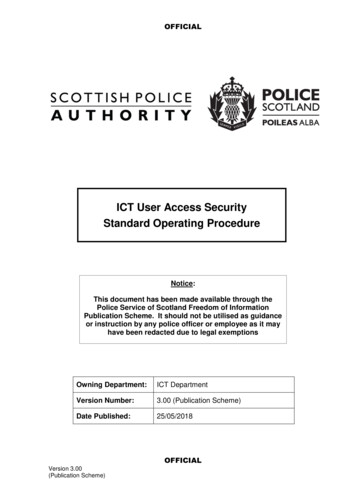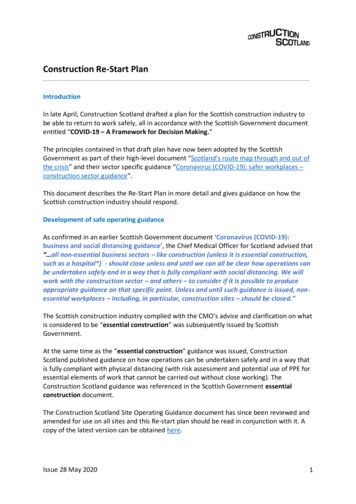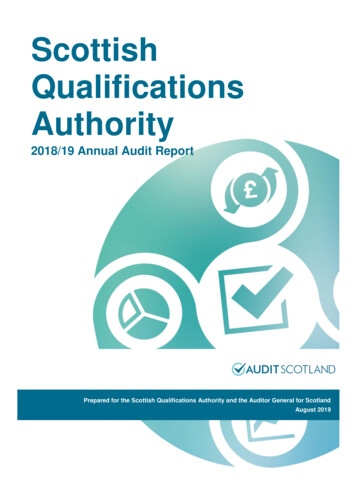
Transcription
ScottishQualificationsAuthority2018/19 Annual Audit ReportPrepared for the Scottish Qualifications Authority and the Auditor General for ScotlandAugust 2019
Who we areThe Auditor General, the Accounts Commission and Audit Scotland work togetherto deliver public audit in Scotland: The Auditor General is an independent crown appointment, made on therecommendation of the Scottish Parliament, to audit the ScottishGovernment, NHS and other bodies and report to Parliament on theirfinancial health and performance. The Accounts Commission is an independent public body appointed byScottish ministers to hold local government to account. The Controller ofAudit is an independent post established by statute, with powers to reportdirectly to the Commission on the audit of local government. Audit Scotland is governed by a board, consisting of the Auditor General, thechair of the Accounts Commission, a non-executive board chair, and twonon-executive members appointed by the Scottish Commission for PublicAudit, a commission of the Scottish Parliament.About usThrough our work for the Auditor General and the Accounts Commission, weprovide independent assurance to the people of Scotland that public money isspent properly and provides value. We aim to achieve this by: carrying out relevant and timely audits of the way the public sector managesand spends money reporting our findings and conclusions in public identifying risks, making clear and relevant recommendations.
Scottish Qualifications Authority 2018/19 Annual Audit Report 3ContentsKey messages4Introduction5Part 17Audit of 2018/19 annual report and accountsPart 211Financial sustainabilityAppendix 117Action plan 2018/19Appendix 218Significant audit risks identified during planningAppendix 3Summary of national performance reports 2018/1920
4 Key messages2018/19 annual report and accounts1The financial statements of Scottish Qualifications Authority give a trueand fair view of the state of the affairs of the body as at 31 March 2019and of the net expenditure for the year then ended. An unqualifiedindependent auditor’s opinion has been issued for the 2018/19 annualaccounts.2Expenditure and income were in accordance with relevant legislation andministerial guidance.3The audited part of the Remuneration and Staff Report, PerformanceReport, and Governance Statement are consistent with the financialstatements and properly prepared in accordance with the accountsdirection.Financial sustainability4The Scottish Qualifications Authority achieved financial balance in2018/19.5The Scottish Government has asked SQA to consider reducing its annualgrant requirement by 4.75m for 2019/20. The SQA has had a good trackrecord in achieving its savings targets. However, with many of the 'easier'savings having already been made, achieving future savings targets willbe a considerable challenge.
Introduction 5Introduction1. The scope of our audit was set out in our Annual Audit Plan presented to the 18March 2019 meeting of the Audit Committee.2. This report comprises the findings from: the audit of the SQA’s annual report and accounts consideration of the SQA’s financial sustainability.3. The management of the SQA is responsible for ensuring the proper stewardshipof public funds. This responsibility includes, inter alia: preparing financial statements which give a true and fair view in accordancewith the HM Treasury Financial Reporting Manual (FReM) and the ScottishPublic Finance Manual (SPFM). ensuring the regularity of transactions by putting in place appropriatesystems of internal control maintaining proper accounting records and appropriate governancearrangements4. Our responsibilities as independent auditor are established by the PublicFinance and Accountability (Scotland) Act 2000 and the Code of Audit Practice2016, and guided by the auditing profession’s ethical guidance.5. We undertake our audit in accordance with International Standards on Auditing,the principles contained within the Code of Audit Practice. At the conclusion of ouraudit, we provide an Independent Auditor’s Report for inclusion in the AnnualReport and Accounts. The Independent Auditor’s Report sets out our opinions on: whether the financial statements give a true and fair view of the state of theaffairs of SQA and of the net expenditure for the year whether the Annual Accounts have been properly prepared in accordancewith the FReM whether the Annual Accounts have been prepared in accordance with therequirements of the Public Finance and Accountability (Scotland) Act 2000and the Education (Scotland) Act 1996 and directions made thereunder bythe Scottish Ministers the regularity of the expenditure and income other matters as directed by the Auditor General6. The Code of Audit Practice 2016 includes provisions relating to the audit of smallbodies. Where the application of the full wider audit scope is judged by auditors notto be appropriate to an audited body then the annual audit work can focus on theappropriateness of the disclosures in the governance statement and the financialsustainability of the body and its services. As set out in our 2018/19 Annual AuditPlan, due to the volume and lack of complexity of the financial transactions, weapplied small body provisions to the 2018/19 audit of the SQA’s Annual Accounts.
6 7. An audit of the Annual Accounts is not designed to identify all matters that maybe relevant to those charged with governance. We have included in this report onlythose matters that have come to our attention as a result of our normal auditprocedures; consequently, our comments should not be regarded as acomprehensive record of all deficiencies that may exist or improvements that couldbe made.8. It is the auditor's responsibility to provide an Independent Auditor’s Report on theAnnual Accounts prepared by management. This does not relieve management ofresponsibility for the preparation of the annual report and accounts. Further detailsof the respective responsibilities of management and the auditor can be found inAudit Scotland’s Code of Audit Practice.9. An action plan is included at appendix 1 (page 24) setting out ourrecommendations to address the issues identified from the audit. Officers haveconsidered the issues and agreed to take the specific steps in the column headed"Agreed management action/timing". Members of the Audit Committee shouldensure that they are satisfied with proposed action and have a mechanism in placeto assess progress and monitor outcomes.10. We confirm that we comply with the Financial Reporting Council’s EthicalStandards. We are not aware of any relationships that could compromise ourobjectivity and independence. We can also confirm that we have not undertakenany non-audit related services and that the previously agreed audit fee of 46,280,is unchanged.11. Our aim is to add value to SQA by increasing insight into, and offering foresighton, financial sustainability, risk and performance, by identifying areas ofimprovement and by recommending and encouraging good practice. In so doing,we aim to help the organisation promote improved standards of governance, bettermanagement and decision making, and more effective use of resources.12. This report is addressed to both the Accountable Officer and the AuditorGeneral for Scotland and following the SQA Annual Accounts being laid at theScottish Parliament the report will be published on Audit Scotland's website:www.audit-scotland.gov.uk.13. The cooperation and assistance afforded to the audit team during the course ofthe audit is gratefully acknowledged.
Part 1 Audit of 2018/19 annual report and accounts 7Part 1Audit of 2018/19 annual report and accountsMain judgementsThe financial statements of the SQA give a true and fair view of the state of theaffairs of the body as at 31 March 2019 and of the net expenditure for the yearthen ended. An unqualified independent auditor’s opinion has been issued forthe 2018/19 annual accounts.Expenditure and income were in accordance with relevant legislation andministerial guidance.The audited part of the Remuneration and Staff Report, Performance Report, andGovernance Statement are consistent with the financial statements and properlyprepared in accordance with the accounts direction.Audit opinions on the annual report and accounts14. The SQA’s Annual Report and Accounts for the year ended 31 March 2019 wasapproved by the Board of Management on 21 August 2019.15. We reported in our Independent Auditor’s Report: an unqualified opinion on the financial statements an unqualified opinion on regularity of expenditure and income the audited part of the Remuneration and Staff Report, Performance Reportand Governance Statement are all consistent with the financial statementsand properly prepared in accordance with the accounts directionSubmission of annual report and accounts for audit16. We received the unaudited annual report and accounts on 13 May 2019 in linewith our agreed audit timetable.17. The unaudited annual report and accounts provided for audit were completeand finance staff provided good support to the audit team which helped ensure thefinal accounts audit process ran smoothly.Whole of Government Accounts18. Whole of government accounts (WGA) are the consolidated financialstatements for all components of government in the UK. The SQA is required toprovide information for the preparation of WGA and external auditors are requiredto review and provide assurance on the WGA return. The SQA submitted its WGAreturn by the deadline. We will review the return and submit the required assurancestatement to the National Audit Office (NAO) within the specified deadline.The SQA’sAnnual Reportand Accounts arethe principalmeans by whichit accounts forthe stewardshipof resources andits performancein the use ofthose resources.
8 Risks of material misstatement19. The concept of audit risk is of central importance to our audit approach. Duringthe planning stage of our audit we identified a number of key audit risks whichinvolved the highest level of judgement and potential impact on the financialstatements. We set out in our Annual Audit Plan the audit work we proposed toundertake to secure appropriate levels of assurance. Appendix 2 sets out thesignificant audit risks identified and how we addressed each risk in arriving at ouropinion on the financial statements.Materiality20. Materiality can be defined as the maximum amount by which auditors believethe financial statements could be misstated and still not be expected to affect theperceptions and decisions of users of financial statements. The assessment ofwhat is material is a matter of professional judgement. A misstatement or omission,which would not normally be regarded as material by value, may be important forother reasons (for example, an item contrary to law).21. Our initial assessment of materiality for the financial statements wasundertaken during the planning phase of the audit. We assessed the materiality ofuncorrected misstatements, both individually and collectively in forming our opinionon the financial statements.22. On receipt of the Annual Report and Accounts and following completion of audittesting, we reviewed our original materiality calculations and concluded that theyremained appropriate. Materiality on receipt of the unaudited financial statementsis summarised at exhibit 1.Exhibit 1Materiality valuesMateriality levelAmountOverall materiality 835,000Performance materiality 501,000Reporting thresholdSource: Audit ScotlandSignificant findings from the audit23. International Standard on Auditing (UK) 260 requires us to communicatesignificant findings from the audit to those charged with governance. Thequalitative aspects of the SQA’s accounting practices, accounting policies,accounting estimates and disclosures are satisfactory and appropriate to theorganisation.24. Significant findings are summarised at exhibit 2. Where a finding has resultedin a recommendation to management, a cross reference to the Action Plan(appendix 1) has been included. 25,000
Part 1 Audit of 2018/19 annual report and accounts 9Exhibit 2Significant findings from the auditFindingResolution1. AccrualsThe amount for trade and other receivables disclosed in theStatement of Financial Position was overstated by 0.426million. This was due to the prepayments and accruedincome including an irrecoverable VAT element. Adjustingthis balance resulted in an increase in net expenditure in theStatement of Comprehensive Net Expenditure.Management has made the necessaryadjustment to the financial statements.2. Change in employee benefit estimation in relation toholiday payThe basis of the calculation of the employee benefitestimation accrual was inconsistent with that of 2017/18. Theaccrual was overstated by 0.097 million.Management has amended the employeebenefit to the prior year basis and havemade the necessary adjustment to thefinancial statements.3. ImpairmentAn impairment of intangible assets of 0.206 million wasincluded within other expenditures in the Statement ofComprehensive Net Expenditure. This should have beenincluded within depreciation and amortisation charges. Therewas no impact on the net expenditure in the Statement ofComprehensive Net ExpenditureManagement has made the necessaryadjustment to the Statement ofComprehensive Net Expenditure.4. Pension liabilityThe impact of two distinct pensions issues, affecting theaccounts of many UK public sector bodies, became apparentduring 2019. We have summarised the issues in paragraphs44 to 49 below.Strathclyde Pension Fund actuariesprovided an estimate of the increase inliability in respect of the issues. TheSQA’s net pension liability increased by 2.423 million from 25.521 million(unaudited annual accounts) to 27.944million.Source: Audit ScotlandEvaluation of misstatements25. It is our responsibility to request that all misstatements, other than those belowthe reporting threshold, are corrected. The final decision on this lies with thosecharged with governance considering advice from senior officers and materialitylevels.26. Management made adjustments for all monetary misstatements whichexceeded the reporting threshold. As a result of these changes the net balance inthe expenditure for the year recognised in the Statement of Comprehensive NetExpenditure increased by 0.524 million with a consequent reduction in both theStatement of Changes in Taxpayers’ Equity and the Statement of FinancialPosition.
10 Other findings27. In addition to the issues set out above, and in accordance with normal auditpractice, a number of presentational and disclosure amendments were discussedand agreed with management.Follow up of prior year recommendations28. The Scottish Qualifications Authority has made good progress in implementingour previous year audit recommendations. All four agreed actions have been fullyimplemented.
Part 2 Financial sustainability 11Part 2Financial sustainabilityMain judgementsThe Scottish Qualifications Authority achieved financial balance in 2018/19.The Scottish Government has asked SQA to consider reducing its annual grantrequirement by 4.75m for 2019/20. The SQA has had a good track record inachieving its savings targets. However, with many of the 'easier' savings havingalready been made, achieving future savings targets will be a considerablechallenge.Financial performance in 2018/1929. Broadly, the SQA has two sources of income to cover its operational costs. Income from fees and charges related to the provision of examinations andqualifications. Central funding, termed “grant in aid”, from the Scottish Government.The main financial objective for the SQA is to ensure that the financial outturn forthe year is within its agreed budget and the grant in aid allocated by the ScottishGovernment.30. The SQA’s budget sets out the level of grant in aid (funding) required from theScottish Government. The amount of grant in aid allocated by the ScottishGovernment is termed the Departmental Expenditure Limit (DEL). The SQAreceives an annual allocation of “resource” DEL to fund current expenditure, and“capital” DEL to fund investment in assets. Resource DEL is further split into cashand non-cash (ringfenced) elements.31. Depreciation, amortisation and impairment are accounting concepts that reflectthe cost of the use of non-current (eg buildings, equipment etc) assets within anorganisation’s financial statements. The Scottish Government provide “ringfenced”non-cash budget allocations to meet these costs. The SQA did not use itsringfenced DEL allocation in 2018/19; non-cash costs were funded by nonringfenced resource DEL. We reported a similar position in 2017/18. Followingadvice from Audit Scotland’s Professional Support section we advised that financeofficers should discuss the situation with Scottish Government sponsors and makethe appropriate changes to the financial statements.32. The SQA had a modest overspend of 0.042 million on its capital DEL budgetof 3.858 million in 2018/19. Expenditure was mainly incurred on theimplementation of the new IT system. This was offset by an underspend of 0.037million on revenue expenditure.33. Overall, actual expenditure incurred was 0.250 million greater than SQA’s finalDEL allocation, exhibit 4. In the main, this comprised of impairments to softwaredevelopment expenditure.Financialsustainabilitylooks forward tothe medium andlonger term toconsider whetherthe body isplanningeffectively tocontinue todeliver itsservices or theway in whichthey should bedelivered.
12 Exhibit 4Performance against Departmental Expenditure Limit (DEL) in 2018/19PerformanceInitial DEL mFinal DEL mActualexpenditure mOver/(under)spend mResource DEL19.34930.10830.071(0.037)Capital DELnil3.8583.9000.042Ring-fenced DELnil1.7902.0350.24519.34935.75636.0060.250Total DELSource: Audited Annual Report and Accounts and Budget Allocation and Monitoring letter 2018/19Short term financial planning34. The SQA generates income from fees and charges but relies on the ScottishGovernment providing deficit funding. A significant factor in the SQA’s operating netexpenditure deficit is the funding model for levying charges for nationalexamination entries. It is the policy of the Scottish Government to keep chargesfrozen at 2010/11 levels and provide deficit funding to meet the shortfall in the SQAcosts.35. In 2018/19, entry fees and other income generated 50.184 million accountingfor 59% of total income. Funding from the Scottish Government ( 35.519 million)accounted for 41% of total income.36. The Board of Management approved SQA’s 2019/20 draft budget in December2018. The budget forecasts a breakeven position after Scottish Governmentfunding is included. The budget sets out the level of funding required from theScottish Government for 2019/20 at 31.925 million ( 30.264 million resource andring-fenced DEL and 1.661 million capital DEL). The initial budget allocationmonitoring letter set out an initial allocation of 18.483 million.37. The 2019/20 budget for core activities was subsequently revised upwardsrequiring an increase in Scottish Government funding of 14.475 million to 33.233million. The Scottish Government does not allocate the full grant requirementneeded by the Scottish Qualifications Authority at the start of the budget year. Thegap in funding is referred to as ‘additional grant’ and is allocated during the year.38. The Scottish Government has asked SQA to consider reducing its annual grantrequirement by 4.75m to 10m as part of a wider savings exercise. Managementhas advised the Scottish Government that a plan has been established to identify 2m of savings and to meet the costs of the Voluntary Early Release Schemeestimated at 0.9m in 2019/20. However achieving savings beyond this level atthis point in the operational year, given the percentage of budget alreadycommitted would be extremely challenging. Scottish Government is aware of theposition and discussions on the funding requirement are continuing.Medium to long term financial planning39. One of the challenges for the SQA is the short-term financial planning cycle ofthe Scottish Government and the resulting difficulty in preparing medium/longerterm funding strategies to address its priorities. The SQA has prepared a mediumterm financial plan for financial years 2019/20 to 2022/23. The plan sets out thefinancial implications of known changes that will occur over this time period.
Part 2 Financial sustainability 1340. The SQA has a three-year Corporate Plan covering the period 2019-2022which includes a high-level financial plan covering the period based on theassumed level of funding and estimated costs against each of its strategicobjectives.41. The SQA recently produced a Medium-Term Financial Plan which identified thefinancial implications of known key changes that will occur over the period until2022/23. In addition, the Business Change and Modernisation Programme sets outthe schemes that will be undertaken over a number of years.42. In subsequent years of the plan the SQA will be required to achieve efficiencysavings. Most of the savings required in 2019/20 and beyond have yet to beidentified. In recent years the SQA has had a good track record in achieving itssavings targets. However, achieving future savings targets will be a considerablechallenge, with many of the 'easier' savings having already been made.43. The SQA has adequate financial planning arrangements in place but remainsconstrained by the Scottish Government’s planning cycle.Pension liability44. The SQA has a long-term liability to secure the pensions of its staff.International Accounting Standard 19 – Employee Benefits requires allorganisations to disclose information on pension liabilities in the financialstatements.45. The SQA is an admitted member of Strathclyde Pension Fund, one of thelargest in the UK with assets of some 23 billion. Valuation of pension fund assetsand liabilities is assessed by an independent firm of actuaries (Hymans RobertsonLLP). Pension liabilities are calculated annually for each individual body, by theactuary, for inclusion in the financial statements. Annual valuations are dependenton a number of external variables, including projected rates of return on assets,projected rates of price and pay inflation, interest rates and mortality estimates.46. The Supreme Court handed down a judgement on a key pensions case, theMcCloud case on 28 June. In a separate case, relating to contracting out of thestate earnings related scheme, the High Court (England) held that pensionschemes must eliminate the discriminatory effects of guaranteed minimumpensions. This is a UK wide issue, most public sector defined benefit schemes areaffected by the judgements. The judgement of the courts meant that pensionliability had to be recalculated.47. The Strathclyde Pension Fund actuary provided an estimate of the increase inliability in respect of the impact of the judgements. As a consequence, the SQA’snet pension liability increased by 2.423 million from 25.521 million (unauditedannual accounts) to 27.944 million.48. The pension liability represents the difference between expected futurepayments to pensioners and the underlying value of pension fund assets availableto meet this liability.49. Over the past decade there has been considerable volatility in the valuation ofpension liabilities across the public sector. For the SQA, the movement over thepast eight years is set out at exhibit 5. Small changes in actuarial assumptions canhave a significant impact on the calculation of closing liabilities.
14 Exhibit 5SQA net pension liability 2011/12 - 2018/19Source: Audit ScotlandSystems of internal control50. As part of our 2018/19 audit we tested key controls operating in the mainaccounting systems. Our objective was to gain assurance that the SQA hassystems of recording and processing transactions which provide a sound basis forthe preparation of the financial statements. We concluded that, generally, controlswere operating satisfactorily.51. During 2017/18 the SQA’s Fraud Response Team was made aware of apotential financial irregularity. The matter is still under investigation. We will monitorthe outcome of the investigation and comment in future reports as appropriate.Governance statement52. We reviewed the assurances which were provided to the Chief Executive asAccountable Officer by the Executive Management Team regarding the adequacyand effectiveness of the system of internal control.53. Several risks are set out in the governance statement. These include issuessuch as financial sustainability risk and workforce issues. The statement alsosummarises internal audit findings and key reports issued in the year.54. We concluded that the information in the governance statement is consistentwith the financial statements and complies with guidance issued by the ScottishMinisters.
Part 2 Financial sustainability 15Openness and transparency55. We reviewed the SQA website and media and committee minutes and notedthat minutes of some board meetings are not timeously published on the website.Recommendation 1The SQA should ensure that minutes of board meetings and otherdocuments for publication are available for public review via the websitepromptly following approval.Internal audit56. Internal audit provides the Board of Management, the Accountable Officer andthe Executive Management Team with independent assurance on SQA’s overallrisk management, internal control and corporate governance processes. Theinternal audit function is provided by Scott-Moncrieff.57. Audit Scotland undertook a central review of the adequacy of internal audit andconcluded that it operates in accordance with the Public Sector Internal AuditStandards (PSIAS) and has sound documentation standards and reportingprocedures in place.58. The annual internal audit opinion, required by PSIAS and reported to the Junemeeting of the Audit Committee, concluded that the SQA has a framework ofcontrols in place that provides reasonable assurance regarding; the organisation’sgovernance framework, effective and efficient achievement of objectives, and themanagement of key risks, except in the area of IT disaster recovery planning.59. At the request of the Executive Management Team, Internal Audit carried out areview of the SQA’s IT disaster recovery planning. A number of significantweaknesses were identified in the SQA’s readiness for an IT disaster. It was foundthat the recovery plans have not been appropriately maintained and are notcapable of supporting an effective response to an IT disaster. Management hasaccepted the findings and have taken action to remedy the situation.National Fraud Initiative60. The National Fraud Initiative (NFI) in Scotland brings together data from localgovernment, health boards and other public sector bodies, to help identify andprevent a wide range of frauds against public funds. Matching data obtained fromthe systems of participating bodies allows the identification of potentially fraudulentclaims on the public purse including housing benefit fraud, occupational pensionfraud and payroll fraud. If fraud or overpayments are not identified in a body, andthe NFI exercise has been undertaken properly, assurances may be taken aboutinternal arrangements for preventing and detecting fraud.61. The current matching exercise produced 97 matches of which 12 werecategorised as priority. All priority matches have been investigated and othermatches have been reviewed, exhibit 5. The results of NFI activity are reported tothe Audit Committee.62. Overall, the arrangements in place to investigate matches and the processesemployed by SQA are satisfactory. However, the secured website should beupdated on a regular basis to allow progress to be monitored more effectively.
16 Exhibit 5NFI activity971228MatchesRecommended ce: NFI secure website: www.nfi.gov.ukEU Withdrawal63. There remains significant uncertainty surrounding the terms of the UK'swithdrawal from the European Union (EU). EU withdrawal will inevitably haveimplications for devolved government in Scotland and for audited bodies. It iscritical that public sector bodies are working to understand, assess and prepare forthe impact on their business in three broad areas: Workforce – the extent to which potential changes to migration are likely toaffect the availability of the people and skills needed to deliver services. Funding – the extent to which potential changes to existing EU fundingprogrammes are likely to affect the finances of public bodies and the activitythat such funding supports. Regulation – the extent to which potential changes to EU regulations arelikely to affect the activities of some public bodies.64. Management undertook a Brexit Risk Impact Assessment using a number ofscenarios, this was presented to the Board and an action plan has beendeveloped. SQA are currently in dialogue with the Scottish Government to identifyimpacts and implications on funding as a result of Brexit eventualities.Dependency on key suppliers65. The impact of a failure or collapse of a key supplier can be significant to anorganisation and can result in either delays or non-completion of major contracts ordisruptions in the continued provision of vital services. This has brought into focusthe risk of key supplier failure and the risk of underperformance in suppliers thatare experiencing difficult trading conditions.66. Dependency on key suppliers is not considered a significant risk by the SQA.Management have advised that there are arrangements in place for managing therisk, including: undertaking financial (financial due diligence), performance and failure riskassessment for new and renewed contracts by procurement function assessment of the continuity arrangements of exam diet key suppliers byprocurement function ongoing
Part 1 Audit of 2018/19 annual report and accounts 7 Part 1 Audit of 2018/19 annual report and accounts Audit opinions on the annual report and accounts 14. The SQA's Annual Report and Accounts for the year ended 31 March 2019 was approved by the Board of Management on 21 August 2019. 15. We reported in our Independent Auditor's Report:
